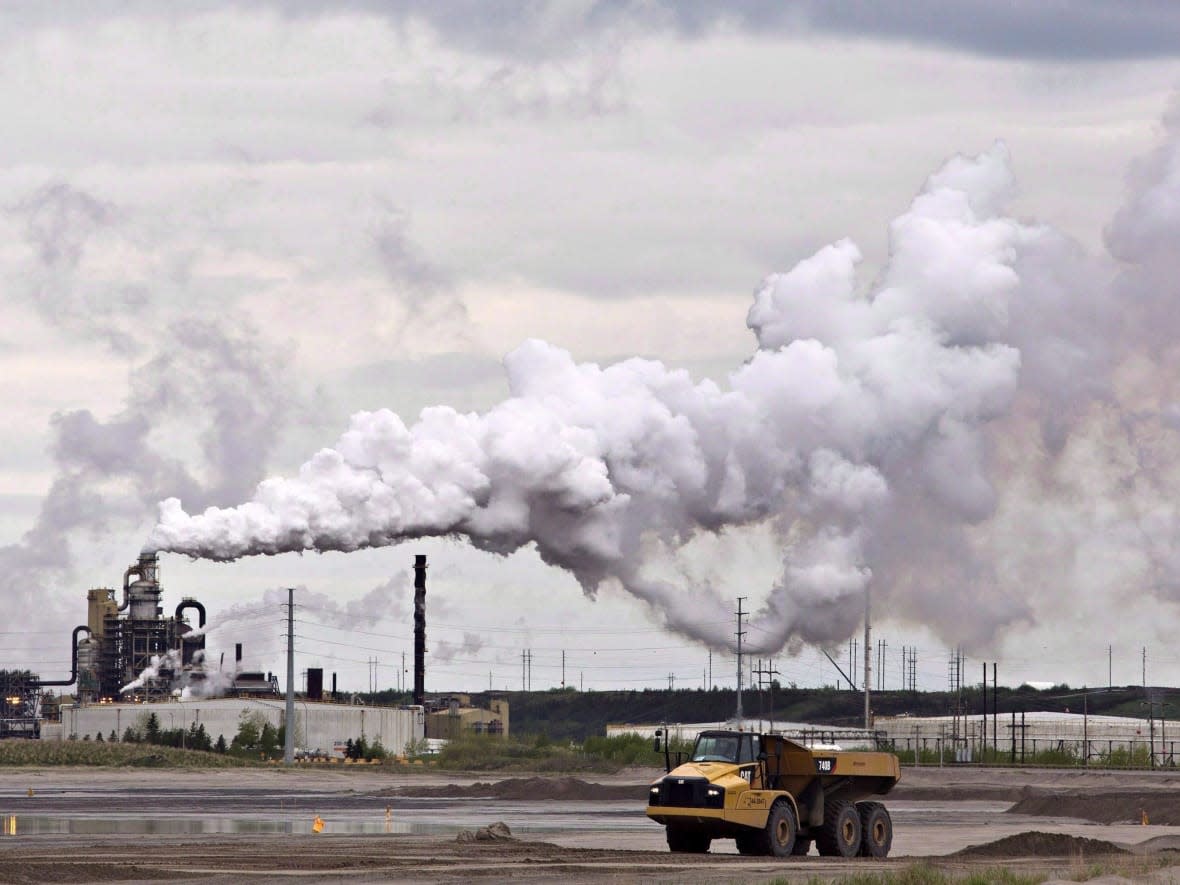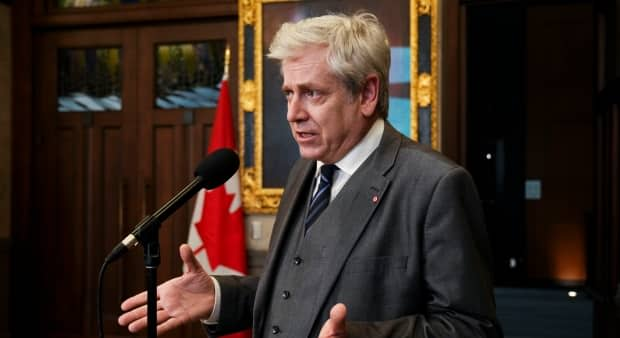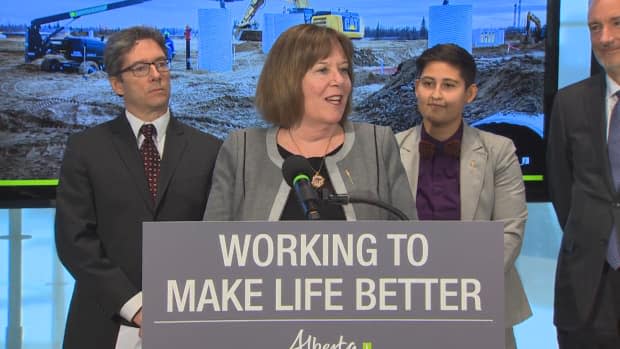NDP MP wants to treat oil like tobacco. Alberta NDP doesn't smoke the same stuff

New Democrat MP Charlie Angus's message this week that the oil and gas sector needs to have its "big tobacco moment" and no longer be advertised positively will play well among the Canadians who largely view fossil fuels as climate-ravaging toxins that must be shunned as quickly as possible.
The federal NDP member's message and new private member's bill will play less well among the Canadians whose livelihoods rely on the production and sale of the fossil fuels that nearly all other Canadians wind up using on a daily basis to move around and stay warm.
And surely almost anyone in this country will recognize where most of those oil-producing Canadians reside — that variously flat and bumpy region whose own provincial NDP wing just so happens to be embarking on a debate over how to redefine themselves.
While it's unclear exactly how the Alberta NDP will want to project themselves to Albertans in their leadership race, it's probably a safe bet that they won't want to outlaw promoting the oil and gas industry as a force for economic good, as Angus, a northern Ontario MP, has proposed.
A private member's bill typically has little chance of getting adopted, and news of its introduction may have been lost on the broader national public, earning more attention from the environmentalists keen to crack down on Big Oil at one end, and those who feel threatened by the popularization and implementation of such an idea at the other.
Angus modelled his bill closely on the 1997 Tobacco Act that placed severe limits on cigarette advertising. In promoting his anti-promotion legislation, he took direct aim at oil groups like Pathways Alliance, the coalition of oilsands companies that heavily advertise their bid to reach net-zero by 2050.
"They're shifting their propaganda with false claims of producing cleaner products, claiming they can be part of the climate solution," Angus told reporters this week. "That's like Benson & Hedges telling you that they can help end lung cancer." (That's a tobacco brand; more Canadians likely knew this before 1997.)
Why link fossil fuels to tobacco? Angus argues that both industries have used misleading marketing about the benefits and drawbacks of their products, and must be understood more plainly as dangers. His bill gets into specifics about what oil and gas marketing cannot do: promote economic benefits or state that one fossil fuel is less harmful than another — for instance, noting that burning natural gas is less carbon-intensive than coal, a patently true fact.
Pathways Alliance's promotions do note that the oilsands contribute a "significant share of our country's emissions" and they're working to reach net zero, the group said in a statement to CBC. The Competition Bureau is investigating whether the corporate group's marketing has made false or misleading claims; this accountability occurs with or without this industry-specific legislation.

By so closely mimicking the old Tobacco Act, Angus's bill also extends to limitations on how retailers (like gas stations) could market their product.
They'd be unable to "provide or offer to provide any consideration for the purchase of a fossil fuel, including a gift to a purchaser or a third party, bonus, premium, cash rebate or right to participate in a game, draw, lottery or contest." Goodbye, Air Miles at the Shell pump, or any sort of comeback of the Petro-Canada commemorative Olympic glasses of yore?
Angus's Fossil Fuels Advertising Act also apes the Tobacco Act's penalties of large fines for manufacturers or prison terms of up to two years — this got the likes of Alberta's premier and others worrying about Ottawa jailing anybody who says nice things about Canadian crude. But it's not as though 1997's legislation filled prisons with nicotine-fiend apologists, and if Smith herself got a police visit when she wrote a positive column about smoking in 2003, we'd have likely heard about it.
Angus and the Canadian Association of Physicians for the Environment promote this idea to stigmatize and denormalize fossil fuels, just like society and advertising laws did in past decades for tobacco. But in 1997, it was already abnormal to smoke; slightly more than 25 per cent of adult Canadians used tobacco, half as many as in the 1960s — and the disappearance of smoking ads and event sponsorships since then may have helped drive the smoking rate to 12 per cent by 2021.
The heavy taxation of cigarettes and bans on smoking in workplaces and bars surely helped that decline, just as governments' attempt to tax carbon-emitting fuels and phase out fuel-burning automobiles could go a ways to curbing oil and gas consumption, with or without specified ad regulations.
But for now, oil and gas are in normal, widespread use in society; alternatives for petroleum cessation are not so easy as chewing gum or a patch. As the country's largest export and much of western Canada's lifeblood industry, it's a more economically significant sector than the phased-out tobacco farms ever were in this country.
So it's small wonder that former Alberta energy minister Marg McCuaig-Boyd told CBC News that Angus's proposal is "tone deaf," and would do nothing to prevent "an environmental side that puts out a lot of mistruths about oil and gas."
A former Alberta NDP energy minister, that is.
McCuaig-Boyd remembers well her tenure in Rachel Notley's government last decade, when she had to try to ignore or create clear distance from the anti-pipeline remarks that federal New Democrats would offer, at a time when the Notley NDP government out west was aggressively promoting pipelines and proclaiming to all of Canada the oil sector's economic importance.

Smith's UCP caucus tried this week to goad the provincial NDP leadership candidates to take a stance on Angus's bill.
New entrant Rakhi Pancholi didn't post anything publicly, but told CBC in a statement: "Picking fights that further polarize the conversation around climate action gets in the way of the real solutions we need." Kathleen Ganley attacked the federal proposal on social media, decrying those who depict a choice between "a future where their children can play outside [without choking on pollution] and keeping a roof over their heads."
Ganley has opened the door a crack to the idea of loosening the ties between the federal and Alberta NDP, calling provincial members' concerns about this "valid" and frequently expressed. Pancholi has also said she'll be receptive to the debate but doesn't wish to take a stance.
While the premier's campaign-time claims that Jagmeet Singh was Notley's boss were overblown, the matter does remain that anybody buying a provincial party membership to vote for Ganley, or Pancholi, or any other candidate for leader in the June 22 contest automatically becomes a member of Singh's and Angus's party.
Keith McLaughlin, a former NDP government aide, predicts that provincial party members would overwhelmingly vote to disaffiliate from the federal wing, given the gaping divide on beliefs on the energy-climate file.
"If we're a big-tent progressive party, the federal NDP … does not represent the perspectives of a big-tent progressive movement in Alberta," he told this week's episode of the West of Centre podcast.
"So how much longer [are] the Alberta NDP and the leadership candidates willing to put up with this?"
These questions will keep coming up, as long as there are fraternal bonds and common memberships for a group of politicians that want to lead Canada's petro-province and another that wishes to treat petroleum as an unmitigated pariah — like the "cancer stick."


